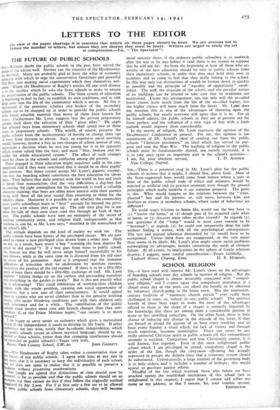LETTERS TO THE EDITOR
[In view of the paper shortage it is essential that letters on these pages should be brief. We are anxious not to reduce the number of letters, but unless they, are shorter they must be fewer. .Writers are urged to study the art of compression.—Ed., " The Spectator"!
THE FUTURE OF PUBLIC SCHOOLS
Sat,—Without doubt the public schools in the past have served the needs of the nation well. Neither can the sincerity of the Headmasters be doubted. Many are probably glad to have the whip of economic necessity with which to urge the conservative Governors and powerful Old Boys into making social experiments which they themselves wel- come. Where the Headmaster of Rugby's articles fill one with dismay is in the sacrifice which he asks the State schools to make to ensure the perpetuation of the public schools. The State system of education is beginning to feel its feet, to establish its own traditions, and to sink deep roots into the life of the community which it serves. All this is threatened if the potential scholars and leaders of the secondary schools are to be snapped up in order to provide the public schools with better educible material than many of them have known for years. Furthermore Mr. Lyon suggests that the private preparatory schools shall share the salvation of their " great allies." He urges that selected boys from elementary schools shall spend two or three years in preparatory schools. This would, of course, preserve the public schools from the inconvenience of having to change their age of entry from thirteen to eleven. Such an expensive social novitiate would, however, involve a boy in two changes of school instead of one, necessitate a decision when he was too young for it to be apparent which system suited him the best, and must " blur, bemuse and be- wilder the whole educational system." The effect of such changes must be chaos in the schools and confusion among the parents.
Those engaged in State education might acquiesce sadly in the con- templated raid if they were convinced that it would be to their pupils' best interests. But many cannot accept Mr. Lyon's gigantic assump- tion that the boarding school constitutes the best education for clever boys. They believe that daily contact with the world in bus and train is better than monasticism; that the very difficulties a day-boy has in creating the right atmosphere for his homework is itself a valuable character training; that boys are often more natural with their parents living with them all the year round than returning to them for the holidays alone. Moreover it is possible to ask whether the community many public schoolboys learn to " love " extends far beyond the privi- leged class with whom they grow up. The side they play for is too often the side of their own class—and this through no fault of their own. The public schools have now no monopoly of the secret of teaching community sense, and religion itself, indispensable as that teaching is, can be, as Mr. Lyon says, " absorbed in the atmosphere of the school's life."
Our attitude depends on the kind of society we wish tor. The public schools have been homes of the privileged classes. We are now asked to create a new privileged class drawn from a wider area. Shall we not, as a result, have many a boy " scorning the base degrees By which he did ascend "? If a boy goes from mine to public school, the chances are that he will never adapt himself successfully to his new fellows, while at the same time he is divorced from his old ones by virtue of his promotion And is it proposed that the immense difficulties of transition shall be undertaken by assistant masters, themselves the product of the old regime? If there is to be a fifty-fifty entry of boys there should be a fifty-fifty exchange of staff. Mr. Lyon deplores " tidying things up on the surface and persuading ourselves that everything in the garden is lovely." But is this not exactly what he is advocating? This small infiltration of working-class children tinkers with the whole problem, creating not equal opportunity of education, but a new area of class consciousness. It would appeal more to parents who are social climbers than to the genuine working classes, who under blitzkrieg conditions part with their children only with reluctance and for a while. The contribution of the public schools must involve more toot and branch changes than they con- template, if, as the Prime Minister hopes, " our society is to move forward."
I am happy to serve under an authority which gives a maintained school all the independence it needs to develop its life freely. If other authorities are less wise, surely that beneficent independence, which the public schools revere in almost mystical language, should be ex- . ended to State schools, rather than that cramping interference should be extended to public schools?—Yours very truly,






























 Previous page
Previous page